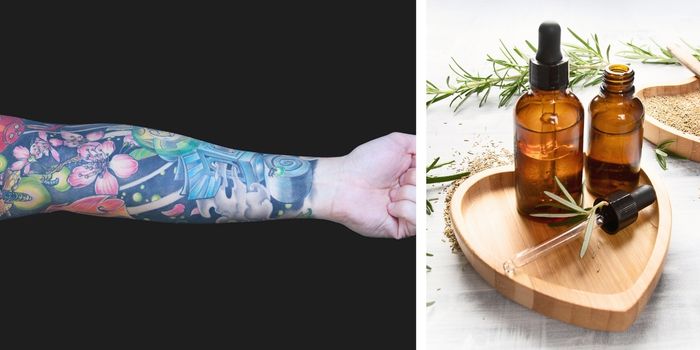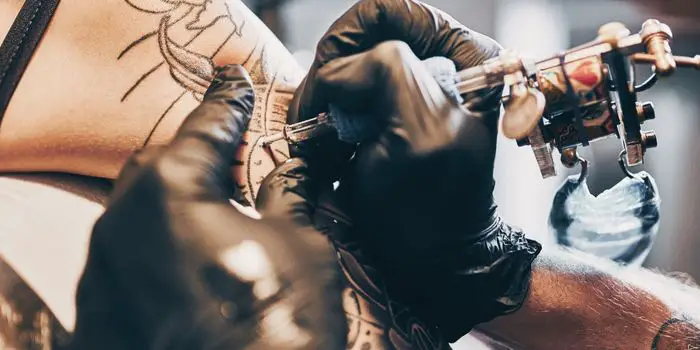
Have you got a new tattoo on your body, and now the only thing in your mind is how to take care of it?
Well, using essential oils can be the most excellent choice when it comes to tattoo aftercare.
As they are entirely natural, it’s an excellent way of healing your tattoo and keeping the infections at bay.
But then, the million-dollar question is which oils to use for tattoo healing – are they all safe to use?
Some essential oils are secure to use on the skin as they are free of added chemicals, colorants, or fragrances that can cause infections.
However, there are a few exceptions that must be diluted before topical application.
These include more potent oils like citronella, cumin, clove bud, lemongrass, oregano, and thyme. While these oils are still safe to use, they may cause skin irritation if applied undiluted.
On the other hand, essential oils like chamomile, eucalyptus, lavender, rose, and tea tree oil can be used without dilution for tattoo healing.
This means you can apply them directly to the skin without worrying about irritation or side effects.
Tattoo Aftercare and Healing with Essential Oils
When using essential oils for tattoo healing, it’s important to do a patch test first. This will help you determine if you’re allergic to any of the oils.
For testing, just add a small amount of the diluted essential oil to a small skin area. Wait for 24 hours to see if there’s any reaction.
The oil is safe for you if there’s no redness, swelling, or itchiness.
Once you’ve done a patch test and know which oils are safe for you to use, it’s time to start using them on your tattoo.
Here are some of the best essential oils for tattoo healing and aftercare:
- Chamomile Essential Oil
- Lavender Essential Oil
- Tea Tree Essential Oil
- Peppermint Essential Oil
These are popular essential oils for speeding up the tattoo healing process – they are known for their anti-inflammatory and antimicrobial properties.
They also make an excellent choice for treating swollen and sore tattoos.
To use these essential oils for tattoo healing, simply dilute them with a carrier oil like jojoba or coconut oil. And apply it to the tattooed area 2-3 times per day.
A few other practical tips you should follow for preventing bacteria growth and promoting quick healing are:
1- Keep Your Tattoo Clean
This can be done by washing your tattooed area 2-3 times daily with lukewarm water and mild, unscented antibacterial soap.
After washing, ensure that you pat dry the area immediately – using a clean towel.
2- Apply a Thin Layer of Tattoo Aftercare Cream or Ointment
You can use a store-bought tattoo Aftercare cream or ointment. But if you want to go the natural route, then you can make your own by mixing together:
- One tablespoon of shea butter
- One teaspoon of coconut oil
- Two drops of lavender essential oil
Keeping your tattoo moisturized and breathing is essential to prevent the tattooed area from drying out and cracking.
So, this is an excellent formulation for keeping your tattoo moist and preventing excessive scabbing.
3- Avoid Hot Water Baths and Saunas
Hot water can irritate your tattoo and delay the healing process. So, avoid taking hot showers or baths until your tattoo is completely healed.
The same goes for saunas and steam rooms – they are a big no-no when you have a new tattoo.
4- Don’t Pick at Your Tattoo
Picking or scratching your tattoo can cause the ink to fade and lead to infections. So, resist the urge to pick at your tattoo – even if it’s itchy.
5- Keep Your Tattoo Out of the Sun
The sun’s UV rays can damage your tattoo and make it fade. So, keeping your tattoo out of direct sunlight is important, especially when it’s still healing.
You can do this by wearing loose, breathable clothing that covers the tattooed area.

Are There Specific Essential Oils That Can Fade a Tattoo?
No, using essential oils could not fade your tattoo. They are often used in tattoo aftercare products to help heal. So you are free to use
But some essential oils can make your skin more sensitive to sunlight. So, I think sunscreen with at least SPF 30 when using these oils on your new or old tattoos is vital.
It is made by injecting ink into the dermis, which is the second layer of skin. The dermis comprises cells called fibroblasts that produce collagen and elastin.
Collagen gives skin its strength and elasticity, while elastin helps it to snap back into place. Together, these proteins form a strong foundation that helps to keep ink trapped in the skin.
However, the body breaks down these proteins over time, causing the tattoo to fade.
Additionally, exposure to sunlight accelerates the breakdown of collagen and elastin, leading to even faster fading. Another thing that can cause tattoos to fade is smoking.
The chemicals in tobacco smoke damage cells and inhibit the production of collagen and elastin, resulting in a loss of color and clarity.
Finally, some people have naturally higher cell turnover rates, which means their bodies are constantly shedding old cells and growing new ones. This process also causes tattoos to fade over time.
The Conclusion
Essential oils are a safe and effective way to speed up the tattoo healing process and prevent infections. But it’s important to do a patch test first to ensure you’re not allergic to any of the oils.
Once you’ve done a patch test and know which oils are safe for you to use, apply them to the tattooed area 2-3 times per day.
In addition to using essential oils, you should also follow other practical tattoo Aftercare tips like keeping the tattoo clean and moisturized, avoiding hot water baths, and not picking at the tattoo.
By following these steps, you can help your tattoo heal quickly and prevent infection.
Meen Smith is a nurse by profession who loves writing online, spending time with her family and caring for the elderly. She has already worked as an associate editor on various moms, babies, home appliances, kitchen, and healthy living blogs. In her spare time, she also enjoys drawing, reading/writing kindle eBooks and improving her skills a bit.
